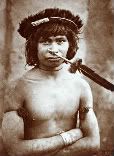Claude Levi-Strauss was considered one of the founding fathers of anthropology. I found an interesting section in chapter 28 of Tristes Tropiques where he describes some of the effects of writing on the Nambikwara, a sparsely populated primary oral culture inhabiting rural Mato Grosso Brazil. The memoire, published in 1955, highlights anthropological studies of rural cultures of different areas but mostly those in Brazil. Chapter 28: A Writing Lesson, details his travels to and with the Nambikwara and the intersection of chirographic and oral cultures.
After traveling to the Nambikwara village, Levi-Strauss gives all the villagers sheets of paper and pencils. "At first they did nothing with them, then one day I saw that they were all busy drawing wavy, horizontal lines. I wondered what they were trying to do, then it was suddenly borne upon me that they were writing or, to be more accurate, were trying to use their pencils in the same way as I did mine, which was the only way they could conceive of, because I had not yet tried to amuse them with my drawings." He goes on to explain how this affected the villagers. "The majority did this and no more, but the chief had further ambitions." Levi-Strauss would ask the chief questions and the chief would draw the horizontal, wavy lines on the pad given him and then show Claude expecting him to understand the meaning behind the drawings. The chief expected them to convey meaning just as the written words do. The Nambikwara chief went even further with his display of feigned writing skill. When the presents which Levi-Strauss had brought with him to give to the Nambikwara people were handed out, the chief took out his notepad and pretended to check it and conduct the ceremony of gift exchange. He had used writing as a tool for the purpose of attaining power over his tribe in a way that differentiated from his role as chief. "It had not been a question of acquiring knowledge, of remembering or understanding, but rather of increasing the authority and prestige of one individual - or function - at the expense of others."
Levi-Strauss goes on to consider the effects of writing on society: "Writing is a strange invention...If we ask ourselves what great innovation writing was linked to, there is little we can suggest on the technical level, apart from architecture...Such, at any rate, is the typical pattern of development to be observed from Egypt and China, at the time when writing first emerged: it seems to have favoured the exploitation of human beings rather than their enlightenment...My hypothesis, if correct, would oblige us to recognize the fact that the primary function of written communication is to facilitate slavery." He tells later on in the chapter about the Nambikwara that they in fact expelled the chief for his false pretenses of knowledge and using it to gain an unfair advantage over his peers.
Another important hypothesis is made by Levi-Strauss in this chapter of Tristes Tropiques: "Although writing may not have been enough to consolidate knowledge, it was perhaps indispensable for the strengthening of dominion. If we look at the situation nearer home, we see that the systematic development of compulsory education in the European countries goes hand in hand with the extension of military service and proletarianization." This furthers the idea of writing as a tool of power and considers the fact that it has furthered nations' concepts of warfare and class control.


No comments:
Post a Comment